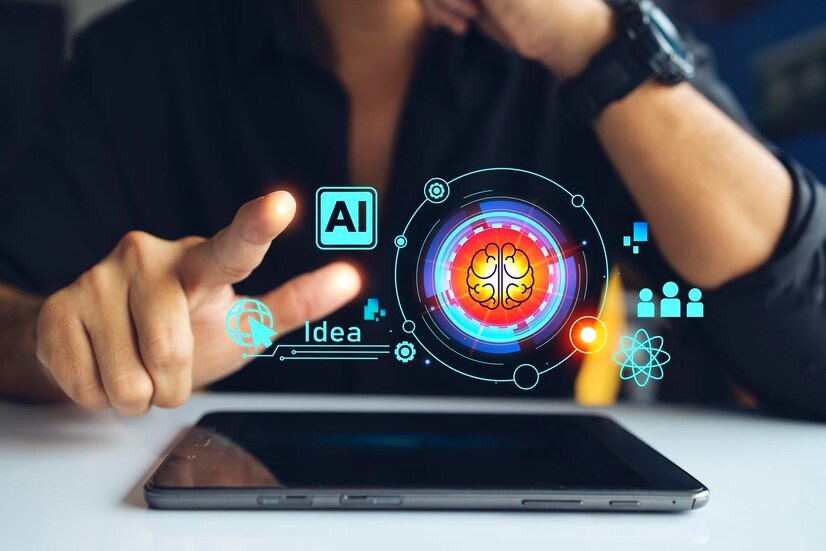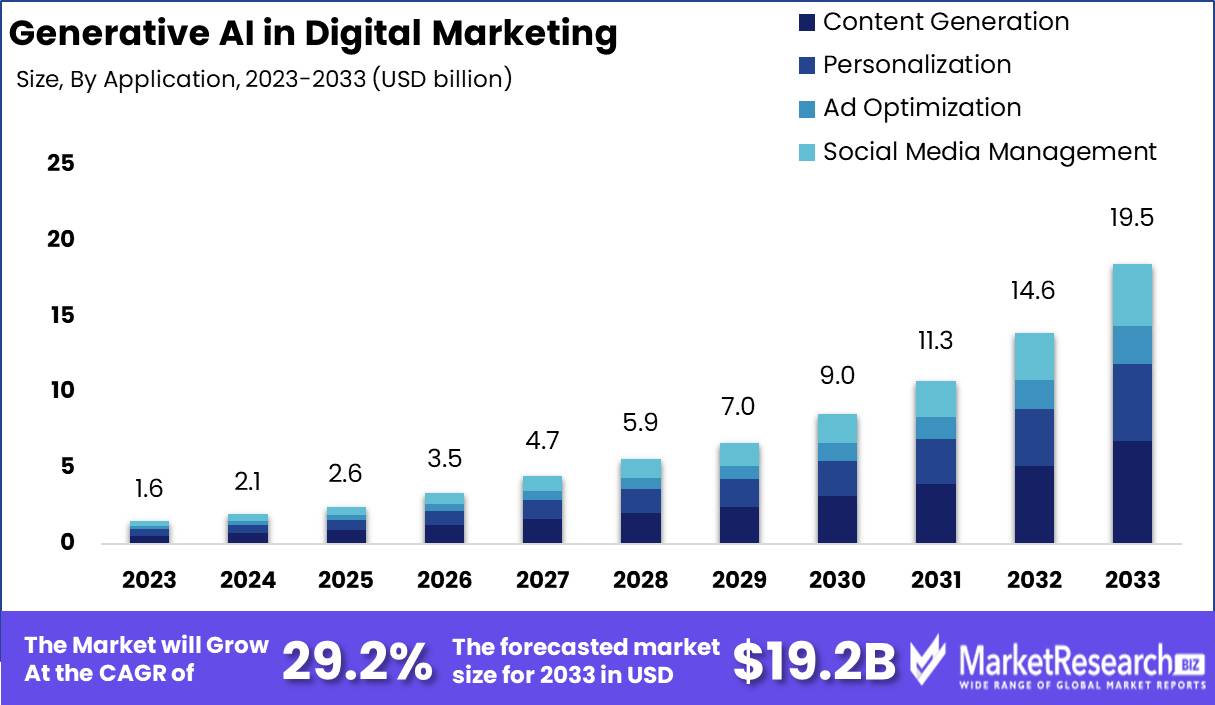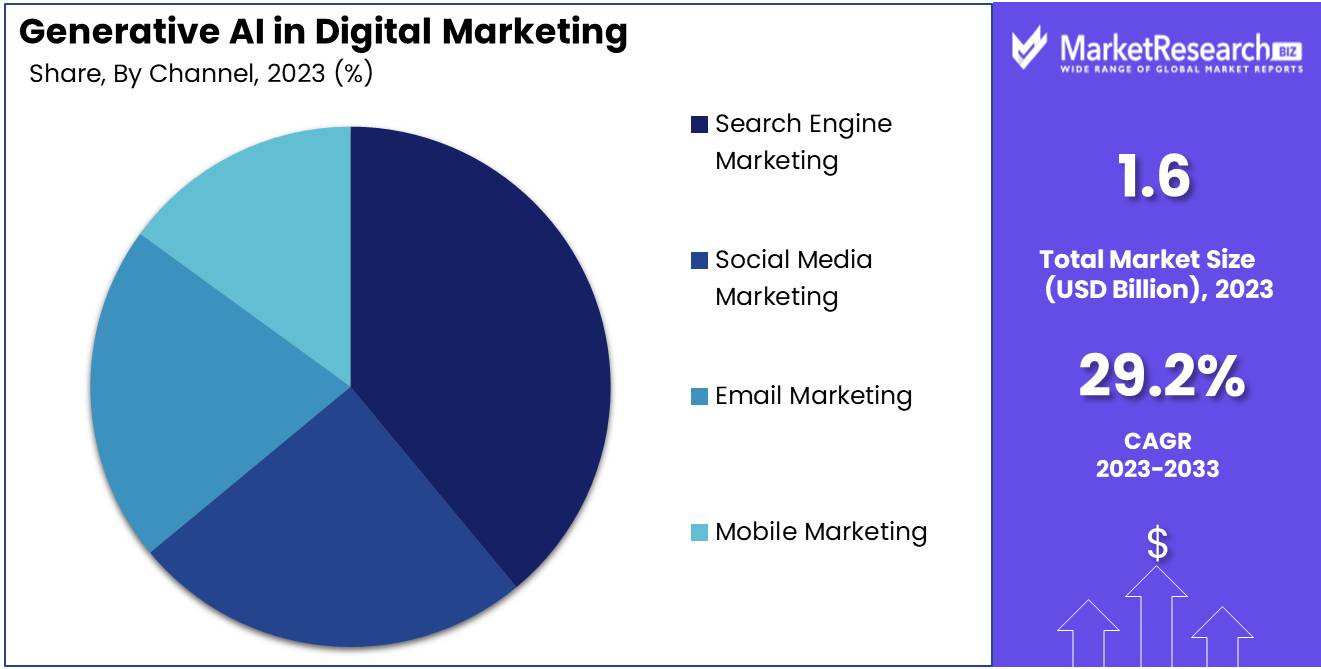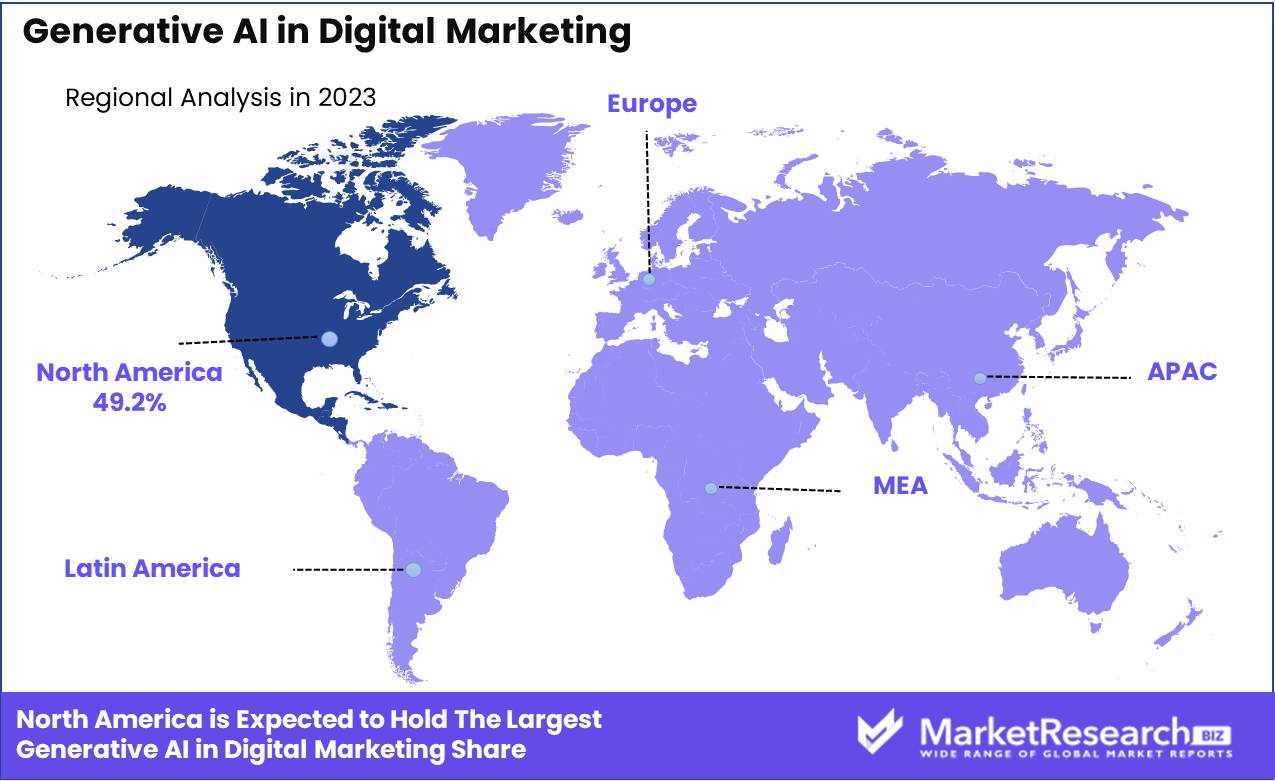
Generative AI in Digital Marketing By Application (Content Generation, Personalization, and Social Media Management), By Channel (Search Engine Marketing, Social Media Marketing, Email Marketing), By Region and Companies - Industry Segment Outlook, Market Assessment, Competition Scenario, Trends, and Forecast 2024-2033
-
39025
-
April 2024
-
300
-
-
This report was compiled by Vishwa Gaul Vishwa is an experienced market research and consulting professional with over 8 years of expertise in the ICT industry, contributing to over 700 reports across telecommunications, software, hardware, and digital solutions. Correspondence Team Lead- ICT Linkedin | Detailed Market research Methodology Our methodology involves a mix of primary research, including interviews with leading mental health experts, and secondary research from reputable medical journals and databases. View Detailed Methodology Page
-
Report Overview
Generative AI in Digital Marketing size is expected to be worth around USD 19.5 Bn by 2033 from USD 1.6 Bn in 2023, growing at a CAGR of 29.2% during the forecast period from 2024 to 2033. The surge in demand for advanced technologies and the rise in small businesses and large businesses are some of the main key driving factors for generative AI in digital marketing.
Generative AI in digital marketing is defined as the utilization of artificial intelligence algorithms to design original, unique, and customized content, ads, and experiences customized to individual customers. It uses methods like natural language processing, image recognition, and predictive modeling to produce dynamic and interactive content that resonates with target audiences.
By analyzing the huge amounts of data that comprise customer choice, behavior structures, and market trends, generative AI makes marketers generate highly applicable and effective campaigns at scale. Such technology allows marketers to automate content creation techniques, enhance campaign performance in real-time, and improve customer interaction and satisfaction. Moreover, generative AI changes digital marketing by making brands offer hyper-customized experiences that propel conversions, nurture brand loyalty, and increase return on investment.

An report published by Spiceworks in May 2023, highlights that the study has been conducted, reflecting that 44% of marketers use it to build email address copy, while 42% use it to create social media copy. About 39% are also using it to develop social media images. Furthermore, 69% of respondents use generative AI to create images, 58% to generate text, and 50% to create audio and video files. However, only 37% use it as chatbots, and 36% use it to generate code snippets.
Moreover, At least 2/3rd use generative AI for creative brainstorming sessions outlines, and first drafts, and 49% use it to generate final content. Further, 78% using generative AI are B2B companies, while 65% are B2C. According to an article published by Intuz in February 2024, Generative AI could increase the productivity of marketing by 5% to 15% of total digital marketing spend, or about USD 463 billion yearly. Additionally, 58% of marketers use generative AI for crafting content, thereby growing performance. That means that by using AI, you can optimize your digital marketing processes and improve the quality of content you put out for your customers.
Generative AI in digital marketing provides real-time customization by making brands offer highly appropriate content customized to individual choices. It makes efficacy by automating content creation methods and enhancing campaigns based on data insights. Moreover, it nurtures new innovations by producing novel ideas and creative solutions for interacting marketing tactics. The demand for generative AI in digital marketing will increase due to its requirement in every vertical of the industries that will help in market expansion in the coming years.
Key Takeaways
- Market Growth: Generative AI in Digital Marketing size is expected to be worth around USD 19.5 Bn by 2033 from USD 1.6 Bn in 2023, growing at a CAGR of 29.2% during the forecast period from 2024 to 2033.
- By Application: Generative AI in content generation is revolutionizing digital marketing with personalized, efficient, and innovative strategies.
- By Channel: In 2023, Search Engine Marketing led Generative AI in Digital Marketing with a 49.2% share, driving personalized strategies.
- Regional Dominance: In North America, generative AI dominates the digital marketing sector with a market share of 47.2%.
- Growth Opportunity: Generative AI will transform digital marketing through innovative content creation and enhanced consumer journey analysis.
Driving factors
Personalization: Catalyzing Engagement and Conversion through Tailored Experiences
Generative AI significantly transforms the digital marketing landscape by enhancing personalization capabilities. In the context of personalization, this technology enables marketers to create highly customized content that resonates with individual preferences and behaviors. For instance, AI can analyze vast datasets to understand consumer habits and predict future buying patterns, allowing for the creation of personalized marketing messages at scale.
Personalization driven by Generative AI not only increases user engagement but also boosts conversion rates. According to a study by McKinsey, personalized recommendation systems powered by Artificial Intelligence can result in a sales uplift of up to 30% in digital commerce settings. This impact is profound as personalized marketing communications directly cater to the unique needs and desires of each consumer, leading to more effective marketing and higher customer satisfaction.
Data-driven Insights: Enhancing Strategic Decision-Making with Precision
The use of Generative AI in harnessing data-driven insights is a game changer for digital marketing. AI technologies, including machine learning models and predictive analytics, process and analyze large volumes of data to unearth patterns that would be indiscernible to human analysts. These insights enable marketers to make more informed decisions regarding campaign strategies, customer segmentation, and resource allocation.
For example, AI-driven analytics can identify which customer segments are most likely to respond to specific marketing tactics, thereby optimizing marketing spend. By predicting customer behaviors and preferences based on historical data, marketers can preemptively tailor their strategies to maximize impact. The precision offered by these data-driven insights significantly reduces wasted advertising spend and increases the efficiency of marketing campaigns.
Improved Customer Service: Building Loyalty and Trust through Enhanced Interactions
Generative AI elevates customer service within digital marketing by automating and personalizing customer interactions. AI-powered chatbots and virtual assistants can handle a wide range of customer inquiries without human intervention, providing instant responses around the clock. This level of on-demand customer service enhances user satisfaction by ensuring that consumers receive help whenever they need it.
Additionally, these Artificial intelligence tools-systems learn from each interaction to improve their responses over time, leading to increasingly sophisticated handling of customer queries. This capability not only boosts operational efficiency by reducing the workload on human customer service agents but also improves the quality of customer interactions.
High-quality, consistent customer service fosters trust and loyalty among consumers, which are crucial for long-term business success. The ability of AI to provide personalized and responsive service interactions makes it a vital tool in retaining customers and enhancing brand reputation.
Restraining Factors
Quality and Accuracy: Ensuring Credibility in Automated Content
The integration of Generative AI into digital marketing primarily hinges on its ability to produce high-quality, accurate content that resonates with consumers. The quality and accuracy of AI-generated content can be a significant restraint in its adoption, particularly in sectors where brand image and voice consistency are paramount. Mismatched or inappropriate content can deter consumer engagement, diminish brand reputation, and lead to lost revenue.
The success of Generative AI tools in digital marketing depends largely on their sophistication – the ability to learn from and adapt to varying contexts and nuances of language used in different brands' communications. However, limitations in understanding context, emotional subtleties, and specific brand tones can lead to outputs that require substantial human oversight and correction. This need for frequent human intervention can reduce operational efficiencies, one of the main value propositions of using AI in the first place.
Regulatory Challenges: Navigating the Complex Landscape of Data Privacy and Usage
Generative AI's deployment in digital marketing also faces significant hurdles from regulatory challenges, especially concerning data privacy and ethical usage. As digital marketing often involves handling large volumes of consumer data, ensuring compliance with data protection regulations such as the GDPR in Europe, CCPA in California, and other global data protection frameworks is crucial. These regulations mandate strict guidelines on data usage, consumer consent, and data storage, which can complicate the deployment of AI solutions that rely on vast datasets to train algorithms.
The evolving nature of these regulations means that marketing teams must stay continually updated on legal changes, integrate compliance into their AI strategies, and possibly deal with restrictions that could limit the effectiveness of AI applications. For instance, the restriction on the use of personal data without explicit consent can limit the training and personalization capabilities of AI tools, directly impacting the effectiveness of marketing campaigns.
In addition to privacy concerns, there is also the issue of transparency and accountability in AI deployments. Legislators and the public alike are increasingly demanding greater clarity on how AI algorithms make decisions, particularly when these impact consumer choices and privacy. The requirement for explainable AI in digital marketing complicates the adoption process, requiring additional layers of technology to decode AI decision processes and ensure they meet ethical standards.
By Application Analysis
Generative AI in content generation is revolutionizing digital marketing with personalized, efficient, and innovative strategies.
In 2023, Content Generation held a dominant market position in the Based on Application segment of Generative AI in Digital Marketing, exemplifying a pivotal role in shaping marketing strategies across various industries. This segment leverages advanced AI technologies to create compelling, high-volume, and highly personalized content efficiently, addressing a critical market need for brands to stand out in a saturated digital landscape.
The adoption of generative AI in content generation not only streamlines the content creation process but also enhances creativity, allowing brands to produce innovative and relevant content that resonates with diverse audiences. This technology has enabled marketers to automatically generate written content, images, and videos, tailored to specific demographics and psychographics, thereby increasing engagement and conversion rates.
As digital marketing landscapes evolve, the reliance on generative AI for content production is anticipated to grow, driven by its ability to reduce operational costs and time expenditures. The integration of AI tools in content generation not only augments human creativity but also ensures consistency and scalability in content marketing efforts.
Furthermore, this application of AI is becoming increasingly sophisticated, with new developments in natural language processing and machine learning algorithms enhancing the quality and relevance of generated content. As businesses continue to prioritize digital transformation, the demand for advanced AI-driven marketing content solutions is expected to surge, reinforcing the strong market position of this segment.
By Channel Analysis
In 2023, Search Engine Marketing led Generative AI in Digital Marketing with a 49.2% share, driving personalized strategies.
In 2023, Search Engine Marketing held a dominant market position in the "Based on Channel" segment of Generative AI in Digital Marketing, capturing more than a 49.2% share. This substantial market penetration is reflective of the growing integration of AI technologies in optimizing search engine algorithms and personalizing user experiences. Search Engine Marketing (SEM) leverages AI to analyze vast datasets, enabling marketers to refine their strategies effectively and target ads more precisely, which boosts ROI and improves conversion rates.
Following closely, Social Media Marketing is the second-largest segment, capitalizing on AI's capability to tailor content to user preferences and monitor engagement trends in real time. This segment utilizes generative AI to create dynamic content and automate responses, fostering a more interactive and personalized user experience that resonates well with the audience, thereby enhancing user engagement and brand loyalty.
Email Marketing, ranking third, has integrated AI to personalize communication at an unprecedented scale. By utilizing generative AI, marketers can craft customized messages based on consumer behavior and preferences, which significantly increases open rates and conversions. This segment benefits from AI’s ability to segment audiences with precision and predict optimal engagement times.
Lastly, Mobile Marketing has shown notable growth, driven by AI’s ability to optimize mobile-specific content and advertisements. This segment leverages location data and user interaction patterns to deliver timely and relevant marketing messages, thus maximizing the immediacy and contextuality benefits of mobile platforms.

Key Market Segments
Based on Application
- Content Generation
- Personalization
- Ad Optimization
- Social Media Management
Based on Channel
- Search Engine Marketing
- Social Media Marketing
- Email Marketing
- Mobile Marketing
Growth Opportunity
Revolutionizing Content Creation
Generative AI is poised to significantly reshape content creation within digital marketing. As brands seek more personalized and engaging content, AI tools offer the ability to generate text, images, and video at scale. This capability not only enhances efficiency but also drives cost-effectiveness by reducing the resources traditionally required for content production. In 2024, the integration of AI in content creation is expected to see a surge as businesses aim to meet the increasing demand for dynamic and customized marketing campaigns. This shift is anticipated to empower marketers to focus on strategy and creative direction, while AI handles rapid content generation.
Enhancing Consumer Journey Analysis
Another profound impact of generative AI lies in its ability to analyze and optimize the consumer journey. By leveraging data-driven insights, AI can predict consumer behavior, personalize interactions, and ultimately, improve conversion rates. In the upcoming year, we expect to see advanced implementations of AI that can sift through massive datasets to uncover patterns and preferences that were previously undetectable. This level of analysis not only refines marketing strategies but also delivers a more tailored, responsive consumer experience. The ability to dynamically adjust marketing messages and channels in real time based on AI-driven insights will be a game-changer, leading to higher engagement and customer loyalty.
Latest Trends
Search Engine Optimization through Strategic AI Integration
Generative AI is poised to revolutionize the field of Search Engine Optimization (SEO) by enabling more dynamic and personalized content creation. As search engines continually refine their algorithms to prioritize relevance and user engagement, generative AI tools are becoming indispensable for marketers. These AI systems can analyze vast amounts of data to identify emerging SEO trends and optimize content accordingly, thus ensuring higher search rankings.
Additionally, AI-driven digital marketing predictive analytics can help marketers anticipate changes in search engine algorithms, allowing for proactive adjustments to SEO strategies. This adaptive approach not only enhances visibility but also improves user experience, as content becomes more aligned with individual search intents and preferences.
Fostering Innovation and Creativity in Digital Marketing through Generative AI Applications
Generative AI is set to be a cornerstone for innovation and creativity in digital marketing strategies. By leveraging AI's capability to generate novel content ideas and formats, marketers can break away from conventional patterns and experiment with new storytelling techniques and multimedia formats. This trend enables brands to differentiate themselves in a crowded market through unique, compelling content that captures the audience's attention.
Moreover, AI's iterative learning process allows for rapid testing and refinement of creative concepts, significantly reducing the time and resources traditionally required for development cycles. As generative AI tools become more sophisticated, they offer an expanding array of possibilities for personalized and impactful marketing campaigns that resonate deeply with targeted demographics.
Regional Analysis
In North America, generative AI dominates the digital marketing sector with a market share of 47.2%.
In North America, generative AI dominates the digital marketing sector with a market share of 47.2%. This region leads due to its robust technological infrastructure, high investment in AI research and development, and a dynamic competitive landscape that drives innovation in personalized advertising, content generation, and customer interaction. The U.S. and Canada are particularly notable for their advanced use of AI tools in enhancing customer engagement and optimizing marketing campaigns.

Europe follows, characterized by its stringent data protection regulations which shape the deployment of generative AI in digital marketing. Despite these regulatory challenges, there is significant growth in AI-driven content creation and data analytics, particularly in the UK, Germany, and France. These tools are being leveraged to tailor marketing strategies to diverse consumer bases across the continent.
Asia-Pacific is experiencing rapid growth in this sector, driven by increasing digitalization and mobile penetration. Countries like China, Japan, and South Korea are at the forefront, utilizing generative AI to tap into vast consumer markets with highly customized digital advertising strategies. This region benefits from a strong manufacturing base for hardware essential to AI development, coupled with governmental support for AI initiatives.
The Middle East & Africa and Latin America are emerging players in generative AI in digital marketing. The MEA region is seeing gradual adoption, facilitated by digital transformation initiatives and smart city projects, particularly in the Gulf Cooperation Council (GCC) countries. In Latin America, growth is spurred by increasing internet accessibility and the digital savvy of its youthful population, with Brazil and Mexico leading in AI adoption for creative and programmatic advertising.
Key Regions and Countries
North America
- The US
- Canada
- Rest of North America
Europe
- Germany
- France
- The UK
- Spain
- Netherlands
- Russia
- Italy
- Rest of Europe
Asia-Pacific
- China
- Japan
- Singapore
- Thailand
- South Korea
- Vietnam
- India
- New Zealand
- Rest of Asia Pacific
Latin America
- Mexico
- Brazil
- Rest of Latin America
Middle East & Africa
- Saudi Arabia
- South Africa
- UAE
- Rest of the Middle East & Africa
Key Players Analysis
IBM Corporation capitalizes on its extensive AI background to refine predictive analytics and customer insights, enhancing campaign personalization and automation. Adobe innovates through its AI-powered creative suite, Adobe Sensei, which streamlines content creation processes, thus enabling efficient and scalable marketing operations. Meanwhile, Acquia focuses on personalized customer experiences through its AI-enhanced digital experience platforms.
Google and HubSpot, on the other hand, contribute uniquely to the AI landscape. Google leverages its sophisticated machine learning technologies to optimize ad targeting and expenditure, aiming to maximize return on investment through smarter predictive models. HubSpot makes AI tools more accessible, particularly to smaller businesses, by integrating AI capabilities into its CRM and marketing automation tools, thus democratizing advanced marketing techniques and fostering inclusivity in the digital marketing space.
These corporations are not only evolving their technologies but also setting the tone for ethical AI use in digital marketing. Their innovations encourage widespread adoption and help shape a future where digital marketing strategies are more personalized, efficient, and ethically grounded. As these key players continue to innovate, they will undoubtedly play a critical role in defining the trajectory of Generative AI applications in digital marketing for 2024 and beyond.
Market Key Players
- IBM Corporation
- Adobe
- Acquia
- HubSpot
- Other Market Players
Recent Development
- In April 2024, Microsoft, in partnership with Cognizant, aims to revolutionize business operations and enhance employee experiences through the adoption of generative AI, with benefits including increased productivity and streamlined workflows. This collaboration, highlighted signifies a pivotal step in driving industry transformation and fostering innovation across sectors.
- In February 2024, Jasper expands into the European market by acquiring Clipdrop, an AI image platform, from Stability AI, enhancing its marketing copilot capabilities.
- In January 2024, in New York, NY, EY and ServiceNow expanded their alliance to provide GenAI compliance, governance, and risk management solutions, aiming to enhance business practices and experiences for EY professionals and clients.
Report Scope
Report Features Description Market Value (2023) USD 1.6 Bn Forecast Revenue (2033) USD 19.5 Bn CAGR (2024-2032) 29.2% Base Year for Estimation 2023 Historic Period 2016-2023 Forecast Period 2024-2033 Report Coverage Revenue Forecast, Market Dynamics, COVID-19 Impact, Competitive Landscape, Recent Developments Segments Covered By Application (Content Generation, Personalization, Ad Optimization, and Social Media Management), By Channel (Search Engine Marketing, Social Media Marketing, Email Marketing, and Mobile Marketing) Regional Analysis North America - The US, Canada, Rest of North America, Europe - Germany, France, The UK, Spain, Italy, Russia, Netherlands, Rest of Europe, Asia-Pacific - China, Japan, South Korea, India, New Zealand, Singapore, Thailand, Vietnam, Rest of Asia Pacific, Latin America - Brazil, Mexico, Rest of Latin America, Middle East & Africa - South Africa, Saudi Arabia, UAE, Rest of Middle East & Africa Competitive Landscape IBM Corporation, Adobe, Acquia, Google, HubSpot, and Other Market Players Customization Scope Customization for segments, region/country-level will be provided. Moreover, additional customization can be done based on the requirements. Purchase Options We have three licenses to opt for Single User License, Multi-User License (Up to 5 Users), Corporate Use License (Unlimited User and Printable PDF) -
-
- IBM Corporation
- Adobe
- Acquia
- HubSpot
- Other Market Players




